|
|
|
Sort Order |
|
|
|
Items / Page
|
|
|
|
|
|
|
| Srl | Item |
| 1 |
ID:
131852
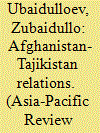

|
|
|
|
|
| Publication |
2014.
|
| Summary/Abstract |
This article attempts to touch upon the relations between Afghanistan and Tajikistan, two neighboring countries, from the historical perspective and the current period. The article analyses the history of Afghanistan-Tajikistan relations during and after the Soviet era, especially during the Afghan Mujahideen's struggle against the Soviet occupational army and Taliban regime in Afghanistan, the Tajikistan civil war of 1992-1997, and after September 11, 2001. In addition, the issues of the ethnic Tajiks in Afghanistan, the violent and vulnerable Tajik-Afghan border, the withdrawal of NATO troops from Afghanistan in 2014 and its impact on Afghanistan-Tajikistan relations, and the new phase of economic relations and an effective cooperation between the both countries are discussed. The article tries to fill the gaps within the body of existing literature and understanding concerning the topic.
|
|
|
|
|
|
|
|
|
|
|
|
|
|
|
|
| 2 |
ID:
131848
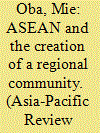

|
|
|
|
|
| Publication |
2014.
|
| Summary/Abstract |
After the ASEAN Concord II called for the building of an ASEAN Community in 2003, the creation of an ASEAN Community became a concrete part of the political agenda for the nations of Southeast Asia, and an ASEAN Community is scheduled to be created in 2015. However, it will all be for naught if the ASEAN Community that is established does not truly contribute to the stability and prosperity of the region. From this point of view, the article will attempt to evaluate the development of an ASEAN community concept and efforts to create it. To clarify the ideal of a true community, this article will take up Karl Deutsch's concept of "pluralistic security communities" and reconsider what a community requires. The article will state that the efforts to create an ASEAN Community should not be underestimated, and the blueprints for the creation of the ASEAN Community outline the formation of a true regional community. It will, however, conclude that in reality there exist factors within the ASEAN region that may shake the development of an ASEAN Community. It has to be said that the fostering of a sense of community at the level of ordinary people, as well as the creation of a community in which fundamental values and norms are shared, are distant propositions.
|
|
|
|
|
|
|
|
|
|
|
|
|
|
|
|
| 3 |
ID:
131843


|
|
|
|
|
| Publication |
2014.
|
| Summary/Abstract |
As relations between Japan and China change due to a paradigm shift that has occurred over the past few years, the need for a new security outlook and world view has emerged. In East Asia, the foundation for the relationship between Japan and China must be fairness and justice, and the rule of law. This article proposes ways that Japan and China can work to cultivate common ground that would bring forth the possibility of a new Japan-China relationship based on the "strategic reciprocal relationship" established in 2006.
|
|
|
|
|
|
|
|
|
|
|
|
|
|
|
|
| 4 |
ID:
131846
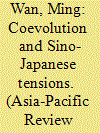

|
|
|
|
|
| Publication |
2014.
|
| Summary/Abstract |
Unlike those who blame the other side or structural forces beyond one's control for the current Sino-Japanese tensions, this paper offers a theoretical insight about the coevolution between China and Japan to explain why the two Asian great powers that had a better relationship in the past are now experiencing greater tensions when their much closer economic and people-to-people ties should facilitate greater cooperation. The two nations have coevolved over millennia with increasing intensity over time. They avoided serious tensions in the 1970s-1990s partly thanks to each being situated in a different niche. But that separation has diminished in a globalizing world and the two countries are becoming more integrated, which has triggered a backlash. The earlier generation of proponents of Sino-Japanese friendship succeeded in forging strong economic and social ties, but the current generation finds it difficult politically and psychologically to manage the new reality in their relations.
|
|
|
|
|
|
|
|
|
|
|
|
|
|
|
|
| 5 |
ID:
131851
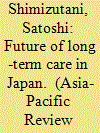

|
|
|
|
|
| Publication |
2014.
|
| Summary/Abstract |
This article reviews a decade of implementation of the public long-term care insurance (LTCI) program in Japan, which is now experiencing unprecedented pressure from its rapidly aging population. This overview of the program's features focuses on the incentive mechanisms and diversity and examines official future projections of LTC costs and their accompanying assumptions. Included is the discussion of possible reforms for the LTCI program, with an emphasis on the micro aspects of LTC, with evidence provided by the Japanese Study on Aging and Retirement (JSTAR).
|
|
|
|
|
|
|
|
|
|
|
|
|
|
|
|
| 6 |
ID:
131845
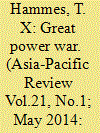

|
|
|
|
|
| Publication |
2014.
|
| Summary/Abstract |
Proponents of a wide range of power transition theories suggest that conflict between the United States and China is inevitable. History indicates that is not true and conflict can be deterred. A key element to that deterrence is an effective Alliance strategy. While the Obama Administration has outlined an effective deterrent national strategy, it has not provided any military strategy. Some have proposed Air Sea Battle can be that strategy. For a variety of reasons, ASB will not work. This article proposes the Alliance adopt Offshore Control as a military strategy to deter China and assure allies and friends in the region. It is based on the concept of defending the first island chain, denying China use of the seas inside the first island chain and dominating the seas outside it. Its deterrent power is enhanced because Offshore Control is affordable, politically feasible, and can be executed today.
|
|
|
|
|
|
|
|
|
|
|
|
|
|
|
|
| 7 |
ID:
131847
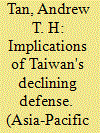

|
|
|
|
|
| Publication |
2014.
|
| Summary/Abstract |
Taiwan's declining defense capability has increasingly tilted the balance of power in the Taiwan Strait towards China. While the current status quo suits Taiwan's domestic political realities and postpones the Taiwan question to the future, its declining defense capabilities vis-à-vis China hold important implications for Taiwan. They include the reduction of its political bargaining power with China, the undermining of stability in the Taiwan Strait as China increasingly has a viable military option, and ultimately decreases the probability that the status quo can be maintained. Left unattended, Taiwan's declining defense capabilities narrow Taiwan's options and could lead to unpalatable outcomes, including sudden crisis and conflict, and the ultimate resolution of the Taiwan problem on China's terms.
|
|
|
|
|
|
|
|
|
|
|
|
|
|
|
|
| 8 |
ID:
131849


|
|
|
|
|
| Publication |
2014.
|
| Summary/Abstract |
Japan is well known as a highly literate nation and ranks high in the actual as well as relative number of books published annually. A significant number of these books include translations of foreign works as well. However, Japanese works translated into foreign languages, especially English, are far less common. While interest in Japan is high, this does not mean Japan has influence. This article argues that Japan's failure to see more of its writers' works, some of which are world class or cutting-edge, published abroad limits not only its public diplomacy and soft power appeal, but also prevents Japan from making a greater contribution internationally. In order to improve this situation, this article introduces a detailed recommendation for a translation/publishing project in which important works of universal importance written by Japanese authors would be identified, translated, and published rapidly to contribute to the intellectual debate on a wide range of subjects in all fields.
|
|
|
|
|
|
|
|
|
|
|
|
|
|
|
|
|
|
|
|
|